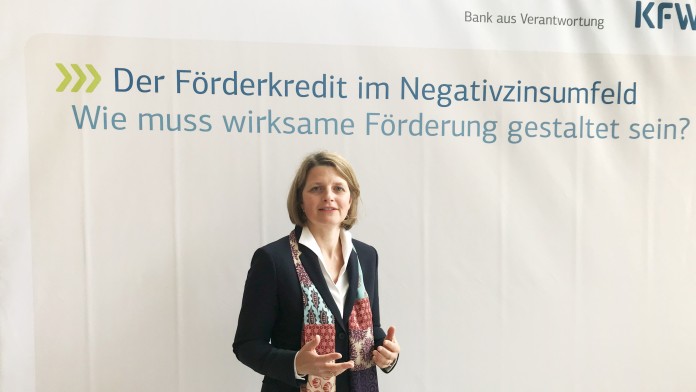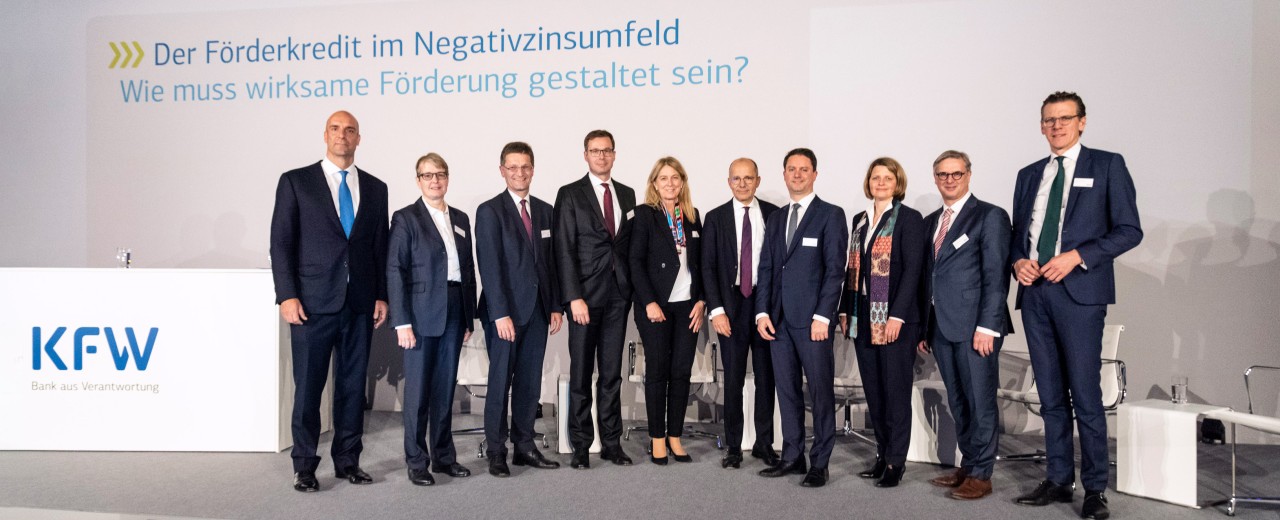Effective support in a negative interest rate environment
- KfW is future-proofing its promotion and preparing to pass on negative interest to financing partners.
- Banking conference at KfW Frankfurt brings together all stakeholders.
In order to be able to perform its promotional mandate optimally even in the current negative interest rate environment, KfW is preparing to introduce a negative funding rate – that is, negative interest to on-lending banks – for all its domestic promotional products. It will be implemented step-by-step and in consultation with the financing partners.
For programmes that are of particular importance in terms of promotional policy, KfW has just developed a transitional solution which is to be implemented in the first quarter of 2020. In this way, KfW intends to swiftly initiate socially and politically desired changes. This transitional solution provides for a grantgrant to be directly committed by KfW after the customer has applied for and received a loan from their regular bank. It will be introduced for the new SME Climate Initiative and for the ‘Investment Promotion for Municipal Enterprises’ and ‘ERP Digitalisation and Innovation’ programmes.
The transitional solution will end as soon as the negative funding rate has been introduced for all domestic promotional programmes. This is expected to take place in the course of the year 2020.
Banking conference in November 2019 – jointly developing good solutions.
On 13 November 2019, representatives of promotional and commercial banks and savings banks came together at the KfW banking conference held under the theme ‘The promotional loan in the negative interest environment’ to discuss how effective promotion needs to be designed in the current interest environment, what role subsidies play as a transitional solution, and what challenges must be overcome. The conference provided clarifications of economic and legal aspects and included the topic of necessary changes in banking IT systems.
In his keynote speech, Dr Bräunig began by explaining promotional benefits and successes. He justified KfW’s move of passing on its favourable funding costs to the on-lending banks by way of what is referred to as a negative funding rate using a corporate finance example: If small or medium-sized entrepreneurs currently have to pay a bank negative deposit interest, then there is no reason they should not benefit from the fallen interest level when they borrow. ‘So we must make changes urgently. From today’s perspective, that still means positive interest for small and medium-sized enterprises because of the banks’ credit margin. Should market interest rates continue to fall, however, I would not want to rule out negative interest for SMEs’, said Dr Bräunig.
He added that KfW would take all necessary measures to be able to pass on its favourable funding conditions to its customers even at negative interest rates, as that was part of KfW’s promotional mandate. ‘Promotional loans at negative interest rates are necessary in the interest of small and medium-sized enterprises, and in the interest of all borrowers who deserve support for their activities’, added Dr Bräunig.
‘Only if we can offer attractive interest rates in the relevant market environment will the most important benefits of the promotional loan continue’, emphasised Dr Hengster in the panel discussion. She presented KfW’s specific plans for a negative funding rate and explained the underlying methodology which KfW and financing partners agreed on as a common standard. ‘We are currently discussing amongst ourselves when exactly the negative funding rate can be introduced, with all the IT systems challenges it poses for banks’, explained Dr Hengster. ‘We are developing the time schedule for its introduction in close consultation so that all can “grow into” the new methodology together’.
Statement of Dr Friederike Köhler-Geib, Chief Economist of KfW

"Real interest rates are decisive for financing and investment decisions. These have been negative on the German capital market since 2016. This has also frequently been the case with the US dollar in the past. So negative real interest rates are not really new. Since early summer, however, nominal interest rates have now also slid below zero almost across the entire yield curve - for German government bonds and in the euro swap market. This is visible to everyone. Since structural factors are among the reasons, it is likely that this environment will accompany us for some time to come.
KfW is facing up to these realities by making it possible to pass on its favourable refinancing conditions even in this environment - so that it can continue to provide optimum funding.
The main reason for KfW's promotion is independent of interest rate levels. This is because KfW becomes active when the market does not produce sufficient results. Take the example of climate protection: a stable climate is a public good. The market does not reflect this. Interest rates for financing investments that make a positive contribution to climate protection are just as high as others without promotion. This is independent of whether capital market interest rates are quoted at 5%, 0% or -1%. Another example: reduced-interest loans for SMEs, which have a relatively poor chance of success in refinancing due to asymmetric information, also retain their justification in a negative interest rate environment. Or even cheap loans for innovators, who can always only collect part of the pensions of their innovations, remain sensible.
Conclusion: Development banks and development loans are also in demand in a negative interest rate environment!"
Sample calculation – effective negative interest in KfW’s promotion
KfW has structurally future-proofed the promotional loan with what is referred to as the ‘negative funding rate’. Should the interest level drop further and result in a demand or need for it, negative customer interest may also be conceivable in the future.
In certain selected cases, customers are already receiving negative interest, even if it does not yet show from outside at first glance: From an economic perspective, the effective interest rate in the ‘Energy-efficient Construction and Refurbishment’ programme over a typical maturity (and with a repayment bonus of 27.5%) is between -6% and -7%. In an extreme case (over a shorter maturity of four years) it can even be -13.2%.
Questions and answers
Yes, KfW still expects negative interest rates in the longer term: first because the cyclical momentum in Germany and the euro area as a whole has slowed significantly in 2019, and second because of the resulting monetary policy decisions by the ECB.


Share page
To share the content of this page with your network, click on one of the icons below.
Note on data protection: When you share content, your personal data is transferred to the selected network.
Data protection
Alternatively, you can also copy the short link: kfw.de/s/enkBcjRA
Copy link Link copied